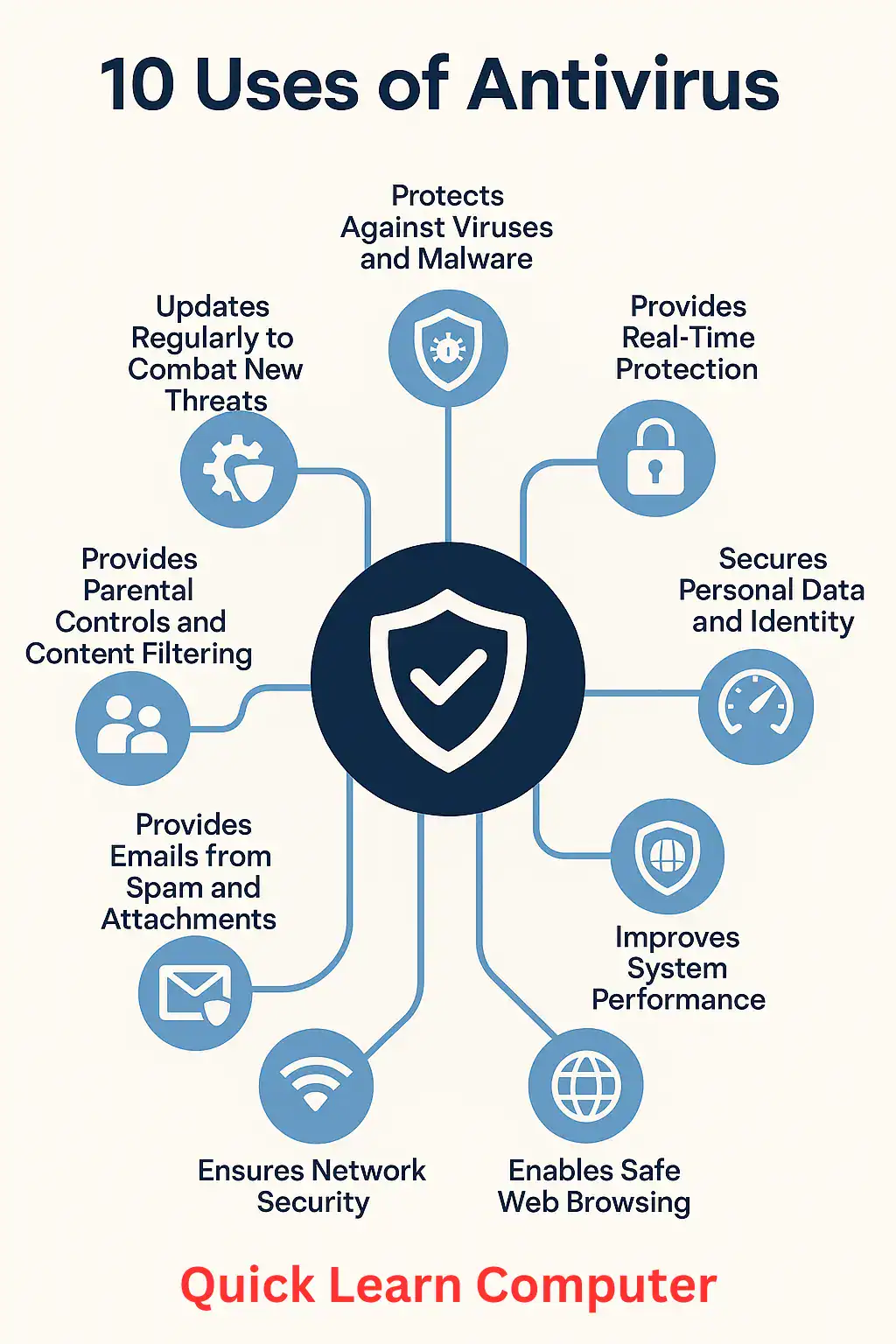In today’s interconnected digital age, antivirus software has become a fundamental tool for maintaining the security of personal and professional data.
From preventing malware infections to blocking phishing scams, antivirus solutions are essential for both individual users and organizations.
In this article, we will explore the 10 uses of antivirus and how it plays a critical role in safeguarding devices from cyber threats.
Whether you're curious about the various uses of antivirus software or considering installing one, this guide offers comprehensive insights.
What is Antivirus Software?
Antivirus software is a security application software designed to detect, prevent, and remove malicious software (malware) such as viruses, worms, trojans, spyware, and ransomware. It monitors your computer in real time and scans files, programs, and websites for suspicious behavior.
Key Functions of Antivirus:
- Real-time protection.
- Automatic updates.
- Threat detection and removal.
- Web browsing protection.
Why Antivirus Software is Essential
The rapid increase in cybercrime and digital fraud highlights the importance of using reliable antivirus solutions. Hackers often exploit unprotected systems to steal sensitive information, spread malware, or disrupt normal computer operations.
By understanding the uses of antivirus software, you can better appreciate its significance in the digital ecosystem.
10 Uses of Antivirus Software
Let’s explore the 10 most important uses of antivirus that make it indispensable in today’s digital environment.

1. Protects Against Viruses and Malware
One of the primary uses of antivirus is to safeguard your device from various types of malware, including:
- Viruses – Malicious programs that replicate and spread.
- Trojans – Disguised as legitimate software to gain access.
- Worms – Spread through networks and devices automatically.
- Spyware – Monitors your activities and steals data.
Strong antivirus software actively scans and eliminates such threats before they can cause harm.
2. Provides Real-Time Protection
Modern antivirus solutions offer real-time scanning and monitoring, ensuring threats are detected as they emerge.
- Monitors all incoming and outgoing data.
- Instantly blocks suspicious processes.
- Warns users about risky behavior or files.
This continuous protection reduces the risk of infection by catching threats early.
3. Secures Personal Data and Identity
With rising concerns over identity theft and data breaches, antivirus software plays a crucial role in:
- Encrypting sensitive data.
- Preventing unauthorized access.
- Blocking keyloggers that record passwords and personal info.
Personal information such as banking details, passwords, and emails are kept safe from hackers and malicious scripts.
4. Blocks Phishing and Fraudulent Websites
Phishing websites often trick users into revealing private information. Antivirus tools:
- Alert users when they access potentially harmful web applications.
- Block phishing links found in emails or messages.
- Prevent download of fake apps and files.
This is a vital use of antivirus software to avoid falling victim to scams.
5. Improves System Performance
Many users are surprised to learn that antivirus programs can actually optimize device performance.
- Cleans unnecessary files and malware.
- Identifies and terminates background threats.
- Reduces system crashes and lag.
Some antivirus tools even come with built-in PC cleaner utilities.
6. Enables Safe Web Browsing
Safe browsing is another important use of antivirus in everyday internet activity. It includes:
- Blocking malicious pop-ups.
- Warning about unsafe downloads.
- Preventing web browser hijacking.
By securing your browsing session, antivirus software shields you from hidden online dangers.
7. Protects Emails from Spam and Attachments
Email is a common source of malware infections. Antivirus software:
- Scans email attachments in real-time.
- Filters spam and suspicious messages.
- Warns about embedded links or executable files.
This is especially useful for professionals and businesses relying heavily on email communications.
8. Ensures Network Security
Antivirus software with network protection features helps:
- Monitor Wi-Fi networks for intrusions.
- Detect and block unauthorized devices.
- Secure connections during online transactions.
For home users and businesses alike, network safety is a critical part of digital hygiene.
9. Provides Parental Controls and Content Filtering
Some advanced antivirus programs include features like parental control and content filtering, which allow:
- Blocking inappropriate websites.
- Restricting screen time.
- Monitoring children’s online activity.
This makes antivirus software a valuable tool for family digital safety.
10. Updates Regularly to Combat New Threats
Cyber threats evolve daily. Reliable antivirus software regularly:
- Updates virus definitions.
- Enhances threat detection algorithms.
- Adapts to new malware variants.
Regular updates ensure you're always protected against the latest cyber risks.
Choosing the Right Antivirus Software
When selecting antivirus software, consider the following:
- Compatibility with your operating system.
- Features offered (firewall, ransomware protection, etc.).
- Reputation and user reviews.
- Price and subscription plans.
Top antivirus providers include Norton, Bitdefender, McAfee, Kaspersky, and Avast.
1. Why is antivirus software important for your computer?
Antivirus is crucial for preventing data theft, malware infections, and online fraud. It keeps your system safe and ensures smooth and secure device operation.
2. Do I need antivirus software if I use Windows Defender?
While Windows Defender offers basic protection, premium antivirus software provides advanced features like firewall, phishing protection, ransomware shields, and secure VPNs.
3. How does antivirus protect your personal data?
Antivirus software detects and blocks spyware, keyloggers, and trojans that attempt to steal sensitive information like passwords, banking details, and personal documents.
4. Is free antivirus software enough for protection?
Free antivirus offers basic security, but for complete protection—especially against phishing, ransomware, and advanced threats—a premium version is recommended.
Conclusion
Understanding the 10 uses of antivirus helps highlight its importance in our daily digital lives.
From protecting personal data to enabling safe web usage and optimizing performance, antivirus software offers a complete shield against cyber threats.
Whether you are a casual user, a business professional, or a parent concerned about your child’s online safety, the uses of antivirus software extend far beyond just scanning for viruses.
Investing in a reliable antivirus solution is a smart step toward secure and stress-free digital living.